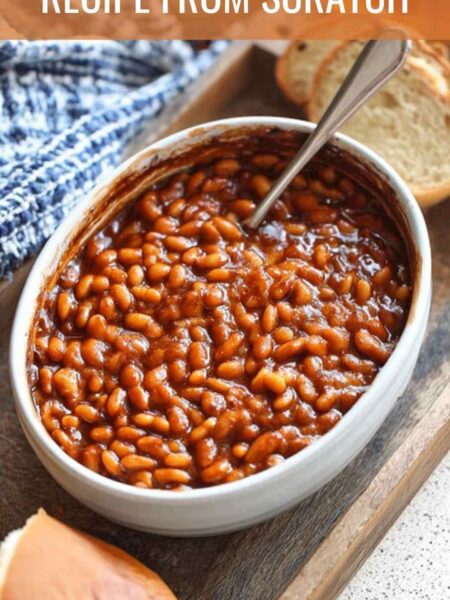Ah, asparagus—you either love it or wonder why you’re looking at a green twig on your plate. However, this humble vegetable can be a delightful companion in your meals or even the star of the show.
Pairing it with refreshing lemon and savory garlic takes it from ordinary to extraordinary. Imagine serving this vibrant dish alongside grilled chicken or fish, or even as a cozy side for pasta. Trust me; you’ll want to keep this in your culinary repertoire!
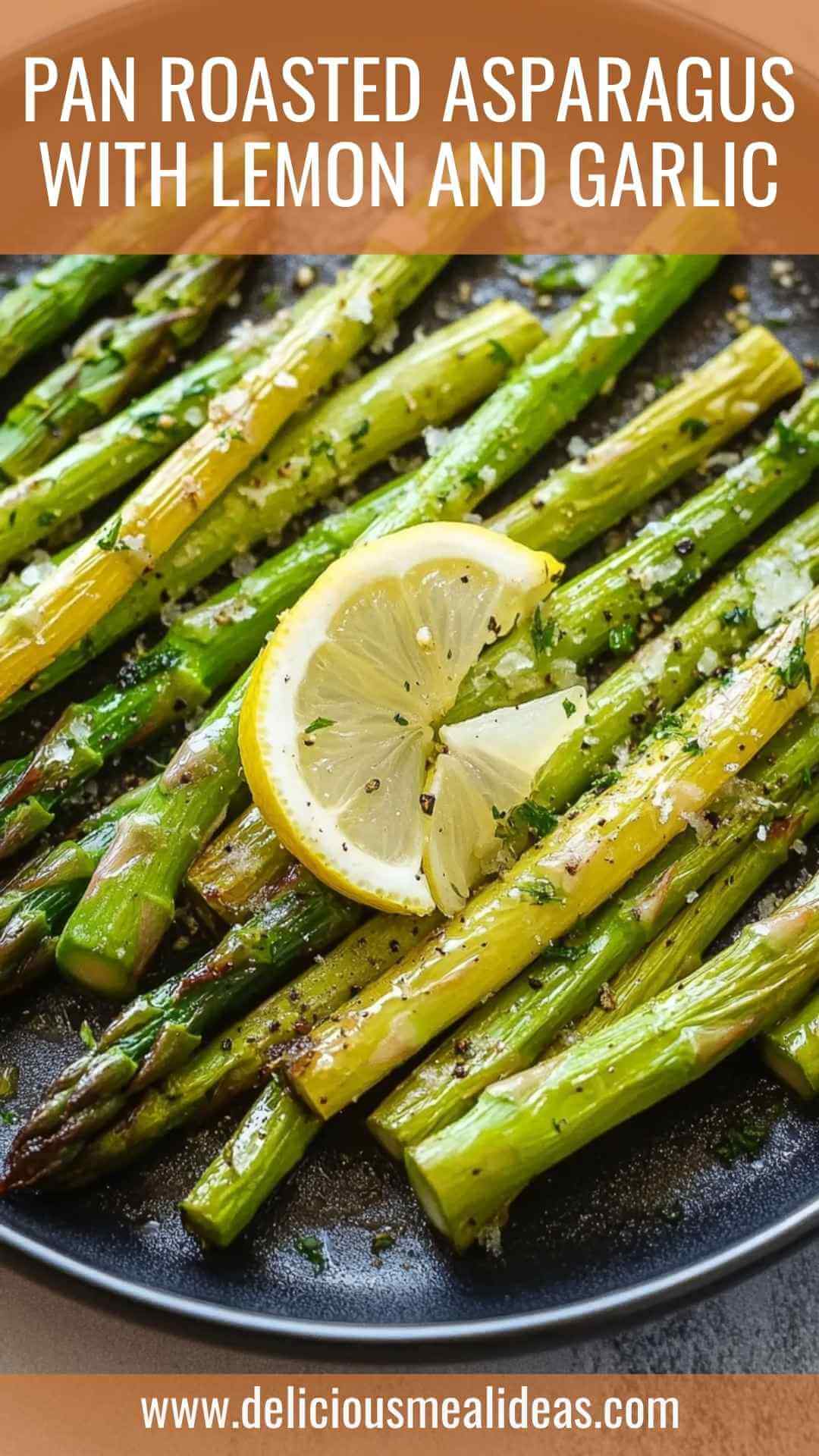
Why This Recipe is Great for You
Let’s talk about health benefits first. Asparagus is a nutritional powerhouse. It’s high in vitamins A, C, E, and K, and it’s also wealthy in antioxidants and fiber. Consuming it may help improve digestion and support heart health, among other benefits. With this recipe, you won’t just delight your taste buds; you’ll nourish your body.
So, how did I come about concocting this easily enjoyed dish? The simple ingredients never cease to impress me. We have fresh asparagus that transforms during cooking. Then there’s garlic—who doesn’t love that punchy flavor?
Lemon brings brightness, balancing out the earthiness. And let’s not sleep on the Parmesan; it creates that umami richness that brings everything to life. I’ve made this dish countless times for gatherings and cozy meals alike, and it always disappears from the table swiftly.
Ingredients to Get You Started
Here’s what you’ll need to achieve this flavor-packed pan-roasted asparagus. Gather these ingredients, and let’s get cooking!
- 1 tablespoon grated Parmesan cheese
- 1 clove garlic, crushed and halved
- 1 pound fresh asparagus (ends trimmed, if necessary)
- 2 tablespoons extra virgin olive oil
- 1/2 teaspoon crushed red pepper flakes
- Juice from 1 medium lemon
- 1 tablespoon filtered water
- Freshly ground black pepper, to taste
- Kosher salt, to taste
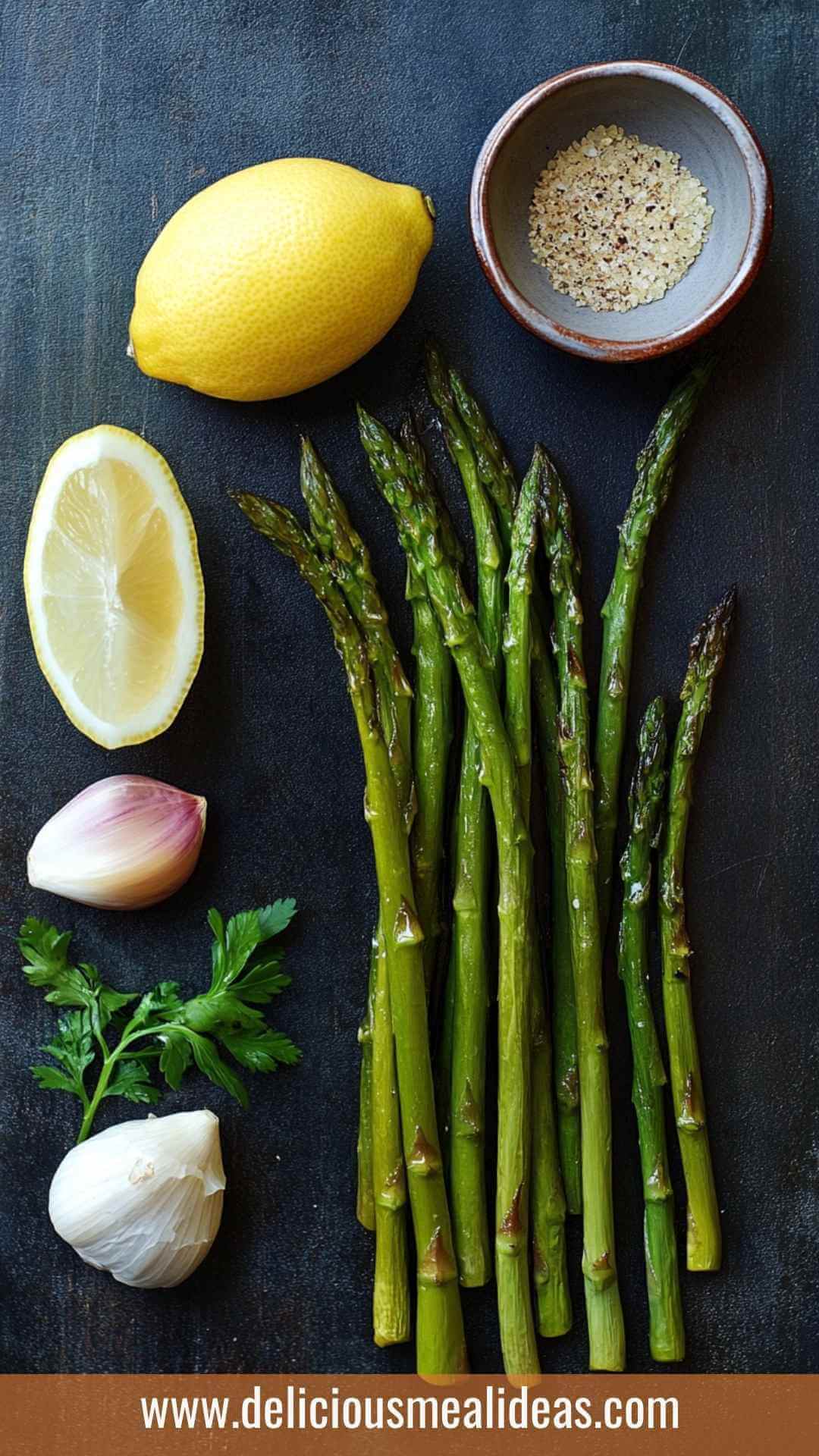
How to Make “Pan Roasted Asparagus with Lemon and Garlic”
Step 1: Prepare Your Asparagus
First thing’s first—let your asparagus shine. I always start with fresh asparagus. Look for vibrant green stalks with firm, closed tips. If the ends seem woody, just trim them off.
Once prepped, pat them dry with a clean cloth. Moisture can lead to steaming rather than that glorious roasting we’re after.
Step 2: Heat Your Pan
Grab a large skillet and heat it on medium-high. I love using cast iron for this, but honestly, any nonstick skillet will work.
Add the two tablespoons of extra virgin olive oil. You want that oil shimmering; this spells the start of something delicious. Don’t skip this step! The oil will help you achieve that golden-brown crust we all crave.
Step 3: Sauté the Garlic
Once the oil is hot, toss in those halved garlic cloves. Sauté them until they’re golden brown. This usually takes about a minute.
Be careful not to let them burn, or they’ll turn bitter. We want flavor, not a tragedy! I enjoy the way the garlic fills the air—it’s like an appetizer for my taste buds.
Step 4: Add Asparagus and Season
Now it’s showtime! Add the asparagus to that hot oil and garlic. Toss the stalks to coat them evenly.
Season with kosher salt and freshly ground black pepper. Don’t be shy with them! The salt will bring out the natural sweetness of the asparagus, while the pepper adds that kick we all need.
Step 5: Roast to Perfection
Let the asparagus cook undisturbed for about three minutes. After this, give them a toss and let them cook for another two to three minutes.
They should be tender yet slightly crispy. If you like a bit more char, leave them a tad longer, but keep an eye on them. The cooking time might vary based on how thick those stalks are.
Step 6: Zing with Lemon and Spice Up with Red Pepper Flakes
Once your asparagus has reached that desired tenderness, it’s time for lemon juice and heat! Squeeze the juice from one medium-sized lemon over the asparagus, then add the crushed red pepper flakes. Stir for another minute or two.
Your kitchen will smell heavenly right about now. To finish, add a tablespoon of filtered water. It creates a little steam and helps marry all those flavors.
Step 7: Grate Parmesan and Serve
Finally, transfer your beautiful asparagus to a serving platter, and sprinkle the grated Parmesan over the top. If you prefer a plant-based version, feel free to omit this step. Grab a fork and dive in; it’s delicious served warm or at room temperature.
Recipe Notes
- Asparagus: This green veggie shines in the spring months, but you can find good quality asparagus year-round. Look for firm stalks that are not wilting. If you can find thin asparagus, I recommend using them as they cook quickly and have a delicate taste.
- Garlic: Fresh garlic is crucial here. It offers flavor that powdered garlic simply can’t match. You might even consider using roasted garlic for an even smoother, sweeter element.
- Extra Virgin Olive Oil: The quality of olive oil matters. A good EVOO adds richness and depth to the dish. Always taste as you go, adjusting the oil content to your liking.
- Lemon Juice: Freshly squeezed adds a zing that bottled lemon juice cannot replicate. It truly brightens up the dish!
- Crushed Red Pepper Flakes: Feel free to adjust the amount according to your spice tolerance. A pinch will do, but if you’re feeling bold, go for more.
- Parmesan Cheese: Grate your own cheese for maximum flavor. Pre-shredded cheese often has anti-caking agents that can alter texture and taste.
Recipe Variations
Anyone who knows me understands that I love to experiment in the kitchen. Want to jazz things up a bit? Here are a few variations:
- Lemon Zest Addition: Before serving, add lemon zest for an extra tangy punch.
- Nutty Flavor: Toss in some toasted pine nuts or slivered almonds after cooking for crunch.
- Additional Veggies: Feel free to add in cherry tomatoes or bell peppers for a colorful medley.
- Herb Infusion: Try fresh herbs like parsley or basil just before serving to switch things up.
- Balsamic Drizzle: For added complexity, drizzle some balsamic glaze over the finished dish.
- Cheese Swap: If you’re not a fan of Parmesan, try feta or goat cheese instead for a different flavor profile.
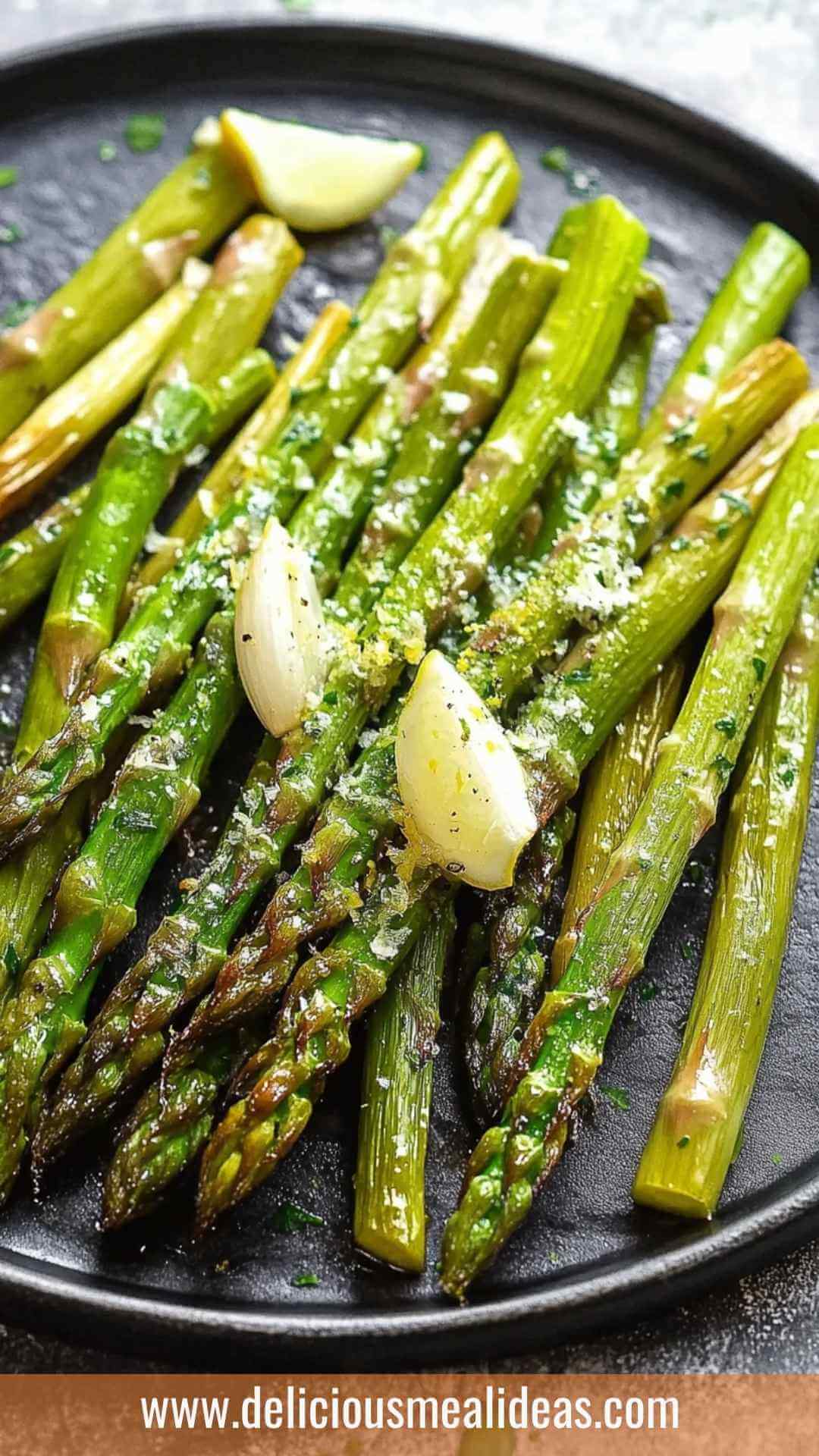
Conclusion
So, there you have it—pan-roasted asparagus with lemon and garlic, a recipe that embodies simplicity and depth of flavor.
Each step is crafted to showcase the beauty of asparagus, making it a star in its own right. With versatile pairings and numerous variations, this dish will stay relevant in your kitchen throughout the year.
As someone who is passionate about food, I invite you to experiment with the ingredients and make this recipe your own. You might even find yourself pondering new combinations—who knows?
This could be your gateway to exploring the extraordinary world of vegetables. Enjoy the cooking process as much as the end product, and watch as this dish becomes a regular on your table! Happy cooking!
You’ll also like the following recipes!
- Best Potato Soup Copycat Recipe Without Bacon
- How To Make Shrimp Scampi Pasta Without Wine
- Best Macaroni Cheese with Butternut Squash
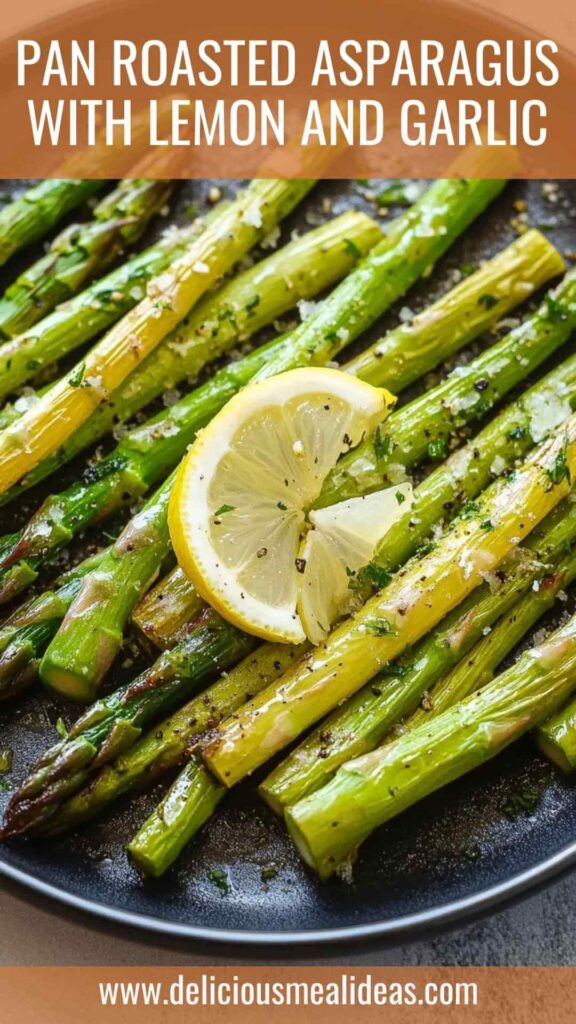
Pan Roasted Asparagus With Lemon And Garlic – Delicious Meal Ideas
Description
Ah, asparagus—you either love it or wonder why you're looking at a green twig on your plate. However, this humble vegetable can be a delightful companion in your meals or even the star of the show.
Ingredients
Instructions
Step 1: Prepare Your Asparagus
-
First thing’s first—let your asparagus shine. I always start with fresh asparagus. Look for vibrant green stalks with firm, closed tips. If the ends seem woody, just trim them off.
Once prepped, pat them dry with a clean cloth. Moisture can lead to steaming rather than that glorious roasting we’re after.
Step 2: Heat Your Pan
-
Grab a large skillet and heat it on medium-high. I love using cast iron for this, but honestly, any nonstick skillet will work.
Add the two tablespoons of extra virgin olive oil. You want that oil shimmering; this spells the start of something delicious. Don’t skip this step! The oil will help you achieve that golden-brown crust we all crave.
Step 3: Sauté the Garlic
-
Once the oil is hot, toss in those halved garlic cloves. Sauté them until they're golden brown. This usually takes about a minute.
Be careful not to let them burn, or they’ll turn bitter. We want flavor, not a tragedy! I enjoy the way the garlic fills the air—it's like an appetizer for my taste buds.
Step 4: Add Asparagus and Season
-
Now it’s showtime! Add the asparagus to that hot oil and garlic. Toss the stalks to coat them evenly.
Season with kosher salt and freshly ground black pepper. Don’t be shy with them! The salt will bring out the natural sweetness of the asparagus, while the pepper adds that kick we all need.
Step 5: Roast to Perfection
-
Let the asparagus cook undisturbed for about three minutes. After this, give them a toss and let them cook for another two to three minutes.
They should be tender yet slightly crispy. If you like a bit more char, leave them a tad longer, but keep an eye on them. The cooking time might vary based on how thick those stalks are.
Step 6: Zing with Lemon and Spice Up with Red Pepper Flakes
-
Once your asparagus has reached that desired tenderness, it’s time for lemon juice and heat! Squeeze the juice from one medium-sized lemon over the asparagus, then add the crushed red pepper flakes. Stir for another minute or two.
Your kitchen will smell heavenly right about now. To finish, add a tablespoon of filtered water. It creates a little steam and helps marry all those flavors.
Step 7: Grate Parmesan and Serve
-
Finally, transfer your beautiful asparagus to a serving platter, and sprinkle the grated Parmesan over the top. If you prefer a plant-based version, feel free to omit this step. Grab a fork and dive in; it’s delicious served warm or at room temperature.
Nutrition Facts
Servings 4
- Amount Per Serving
- Calories 82kcal
- % Daily Value *
- Total Fat 5.1g8%
- Saturated Fat 1.3g7%
- Cholesterol 11mg4%
- Sodium 91mg4%
- Total Carbohydrate 6g2%
- Dietary Fiber 2g8%
- Sugars 2g
- Protein 5g10%
* Percent Daily Values are based on a 2,000 calorie diet. Your daily value may be higher or lower depending on your calorie needs.
Note
- Asparagus: This green veggie shines in the spring months, but you can find good quality asparagus year-round. Look for firm stalks that are not wilting. If you can find thin asparagus, I recommend using them as they cook quickly and have a delicate taste.
- Garlic: Fresh garlic is crucial here. It offers flavor that powdered garlic simply can’t match. You might even consider using roasted garlic for an even smoother, sweeter element.
- Extra Virgin Olive Oil: The quality of olive oil matters. A good EVOO adds richness and depth to the dish. Always taste as you go, adjusting the oil content to your liking.
- Lemon Juice: Freshly squeezed adds a zing that bottled lemon juice cannot replicate. It truly brightens up the dish!
- Crushed Red Pepper Flakes: Feel free to adjust the amount according to your spice tolerance. A pinch will do, but if you’re feeling bold, go for more.
- Parmesan Cheese: Grate your own cheese for maximum flavor. Pre-shredded cheese often has anti-caking agents that can alter texture and taste.




